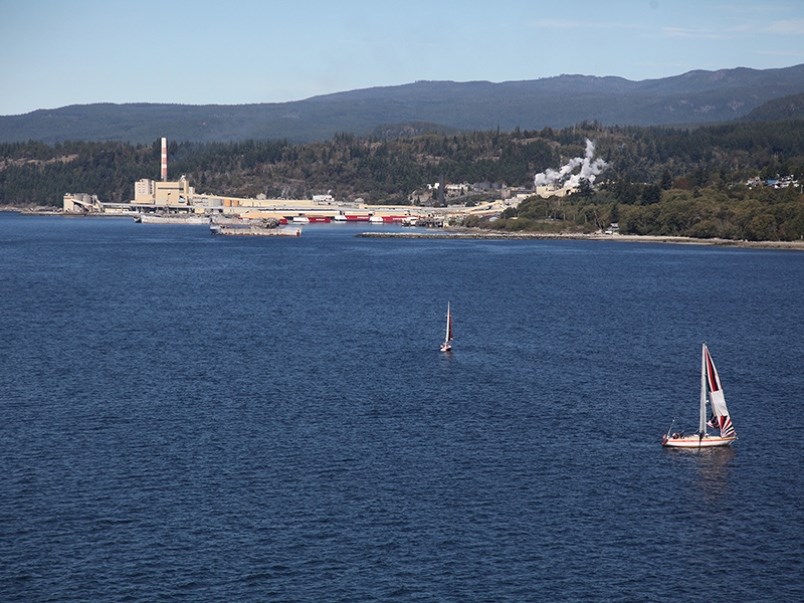City of Powell River Council has directed staff to explore expanding the level of treatment at the consolidated wastewater treatment plant, which is under construction.
At the March 4 city council meeting, council carried a motion that council direct staff to explore funding opportunities to support the detailed design and construction of phase one of a tertiary treatment system as per Associated Engineering’s April 2020 preliminary design report for tertiary treatment; and explore opportunities for piloting an advanced oxidation process (AOP) system, or other advanced treatment system (i.e. phase two), for the removal of contaminants of emerging concern.
Councillor CaroleAnn Leishman, who made the motion, said council had received a number of delegations in relation to unknowns around the new plant.
“It’s an emerging issue and the federal and provincial governments still don’t have requirements,” said Leishman. She added that motions have been put forward to municipal associations trying to encourage the government to put in place levels of acceptable contaminants of emerging concern, including items such as pharmaceuticals, microplastics, contraceptives, hormones and different types of toxins flushed down drains.
Council voted unanimously in favour of the motion.
Prior to the council meeting, Dave Wheatley, a Townsite Ratepayers Society director, addressed the March 2 committee of the whole meeting, indicating that compared to other communities building wastewater facilities, Powell River is lagging. He made comparisons to the North Shore, Langley, Iona, near Richmond, and Capital Regional District, serving eight municipalities in the Greater Victoria area.
Wheatley said with regard to open air sewage tanks, all four comparative plants will be enclosed for control of bioaerosols that affect human health and for odour control. Powell River’s plant will not have this feature, said Wheatley.
He also said all four comparative plants will have tertiary treatment via micro disc filtering to remove 99 per cent of microplastics and many contaminants. He added that Powell River’s will not. The plant is designed for secondary treatment of wastewater.
With regard to biosolids, which Wheatley characterized as sewage sludge, he wondered what the destination of it would be.
“Powell River, as I understand it, presently provides biosolids for spreading on farms on Vancouver Island,” said Wheatley. “Powell River has not yet announced what it will do with the sludge from the new wastewater treatment plant in Townsite. However, our municipal government must make its intentions known to the ministry of environment in the near future.
“In January 2021, the Tla’amin people received a federal and provincial grant to build a composting facility on the Townsite waterfront adjacent to the new wastewater treatment plant. Will this be the new destination of our sewer sludge?”
Wheatley said Powell River city council’s position is the federal government has no regulations for tertiary sewage treatment and covered sewage tanks. Therefore, there is no need to spend taxpayer monies now on regulations that will exist sometime in the future, he added.
“However, enough scientific data has now been collected, such that over 20 neighbouring coastal municipal governments are building enclosed wastewater treatment plants with tertiary-level treatment, in order to protect human health and the biodiversity of species listed at risk in the Salish Sea,” said Wheatley. “Powell River can learn from the expertise of our nearby coastal communities.
“Powell River city council needs to borrow research ideas and technological answers from our neighbours and get on with improving the new wastewater treatment plant that will underpin our economy and the health of the Salish Sea for the next 50 to 60 years. This needs to be done now.”
Councillor says city shares concern
Councillor Cindy Elliott said she wanted to assure Wheatley that the city shares his concerns for the environment. She said she has been assured by engineers that there is room to add tertiary treatment as soon as there are standards.
“I think that’s how we plan to proceed,” said Elliott. “I don’t see how we can afford to move forward all on our own.”
Wheatley said he believes Powell River will suffer economically if the city does not move forward with advanced treatment. He said other communities have gone to senior levels of government and received funding for the upgrades he is recommending, and that Powell River should be able to do that, too.
Leishman said she thought what Wheatley is asking about is the need to engage the engineering firm that designed the plant to provide a notion of what would be required. She said council has received a presentation from Associated Engineering, which was asked to take a look at what would be required to add tertiary treatment once regulations are put in place. She said the problem is there are no requirements for tertiary treatment.
“We need to probably spend some money and get an engineer to give us an idea what we would be looking at to add a higher level of tertiary treatment to our newly designed plant,” said Leishman. “Then, we could get some costing on what that would be.
“There is apparently federal grant money. We could ask staff to look into what would be required and how much money would be required to do an initial analysis of what some of the options are for tertiary treatment, and then go from there and see if we could create a plan to apply for grant funding for that add-on.”
Mayor Dave Formosa made a motion that council direct staff to work with the climate change mitigation and adaptation committee to do some investigation and report back on what kind of budget would be needed to come up with an estimation of what it may cost the city to add tertiary treatment to the new facility.



